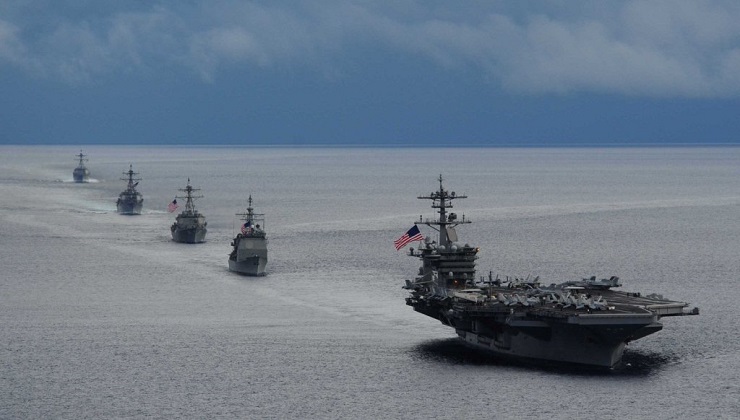The Islamic State (IS) has been defeated in Syria root and square, but the war hasn’t ended yet and it might not end as long as the American war machine continues to pound both directly and in-directly. While the American war machine’s involvement in the war and its stubborn refusal to leave makes it clear that the war was never simply a part of the agenda to defeat terrorism and that it had—and continues to—more to do with regional geo-politics, the recent most events related to this crisis have once again proved that geo-politics and the imperatives of containing both Russia and Iran remain the primary push factors, keeping the US perennially locked into Syria, and allowing the war machine, which is allied with the Western mainstream corporate media and has allies in the White House, to continue to project Assad as ‘devil’ and Russia a sponsor and protector of ‘evil.’
As of today, the entire western world is apparently shaking with the ‘horrors’ of chemical attacks by Syria’s Assad on its own people. But, as is often said, this western madness over the manufactured attack has a certain method. Most importantly, the attack reflects the way the US war machine is orchestrating the ‘horrors of war’ to keep the US war-economy afloat and the region dipped in conflict.
Therefore, just when the US president Donald Trump had started to talk about withdrawing the US military from Syria, the news of a chemical attack struck his ‘good intentions’, forcing him to promise a strong military response to Assad. This, however, isn’t that simple enough, considering that such a withdrawal was never actually going to happen even if Trump was himself serious about it. The president and his generals differ on what victory means.
As such, while Trump wanted to withdraw, the Pentagon was preparing, as reports in the Western media said, to actually send dozens of additional troops to Syria, but was caught off-guarded by the Trump announcement, and has now orchestrated the chemical attack to take the initiative away from him and revamp the crisis. And, the Pentagon, explicitly representing the US deep state’s agenda, has succeeded in doing that.
How could the ‘deep state’ reconcile that easily to Trump’s positive overtures to ending the war in Syria and even inviting Russia’s Vladimir Putin to the White House? Such a meeting could have possibly revived the possibility of joint US-Russia peace initiative in Syria, and could have further made Donald Trump a party to the Russia-Iran-Turkey led peace process. But such a step could have also rendered further continuity of war meaningless and left Pentagon’s plans of increasing US military presence counter-productive. Therefore, to make its plans productive and to prolong the war, the White Helmets, the latest manifestation of propaganda war through ‘humanitarian services’, were brought to service once again.
As such, while Trump seems to have sensed that by re-allying with Russia, the US position could be revamped in Syria; his generals seem to think that such a strategy could bring a defeat of the US objectives. The generals, as many of them have indicated many times, think ‘true victory’ lies in militarily staying in the game. Therefore, for them, Trump’s willingness to opt withdrawal could never bring the US a clear victory.
In fact, this is how the US military’s war-fighting doctrine defines victory. The document concludes that actual winning is not an absolute victory, but “more of a continuum”, a prolongation of fighting and an endless war waged both directly and indirectly.
In this context, this is exactly what the US war machine has once again done in Syria. Just when the US president was hinting at the possibility of reaching a negotiated end of the crisis, the news of chemical attack war broken and a new continuum was added, leading even the President to warn of military action and grave consequences.
But the US ‘deep state’ is not worried just because Trump is willing to talk to the Russians; their true source of worry is the way Russia-Iran-Turkey triangle has been successful, despite western hopes of divergences, in consolidating its position in Syria by synching their interests on a number of aspects of the war.
Consider this: the recently concluded Astana summit made it explicitly clear that none of the parties to the summit was either interested in territorially dividing Syria among themselves or allow the US and its allies do the same. The statement said, alluding to the US, that “all attempts to create new realities on the ground under the pretext of combatting terrorism” were to be opposed and stand rejected by the coalition. This opposition also means that the triangle equally opposes a US military presence, whether open-ended or close-ended, in Syria.
Now, with Trump potentially seeking a withdrawal and expressing his willingness to let others do the rest of the job, for the ‘deep state’, this is like surrendering Syria to the Russians and their allies and accepting defeat at their hands—something that can never be acceptable to the US generals and war mongers, who, as indicated earlier, are heavily inclined to prolongation of the wars the US is involved in.
The potential dramatic impact of the (fake) news of chemical attacks has been that the US president has now moved away from inviting Putin to the White House to an inch closer to directly confronting Russia. Nothing else could have been more satisfying for the ‘deep state’ than seeing their success in considerably slowing down, if not all together killing, the prospects of US-Russia co-operation in Syria to end the war.
Salman Rafi Sheikh, research-analyst of International Relations and Pakistan’s foreign and domestic affairs, exclusively for the online magazine “New Eastern Outlook”.

